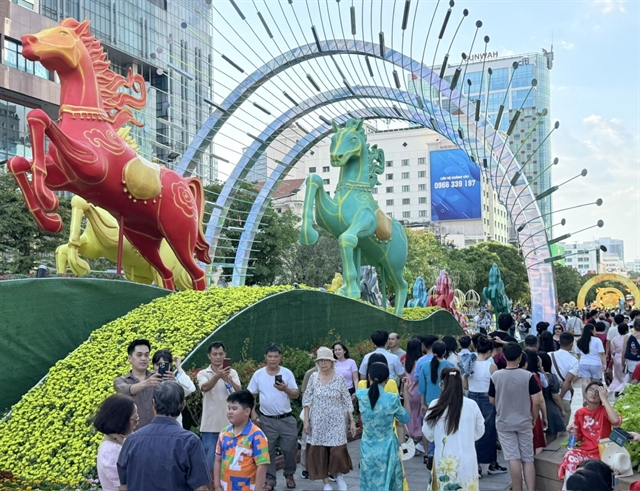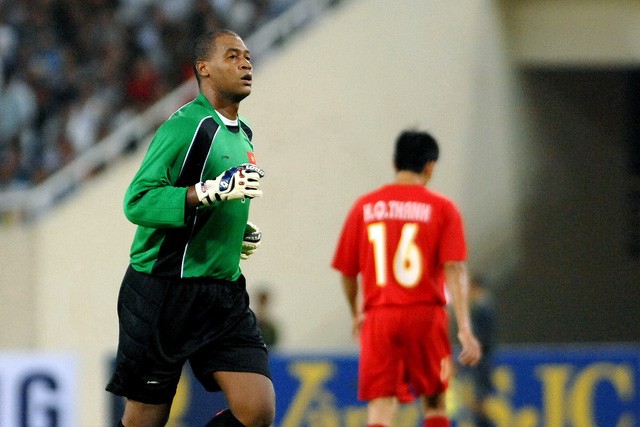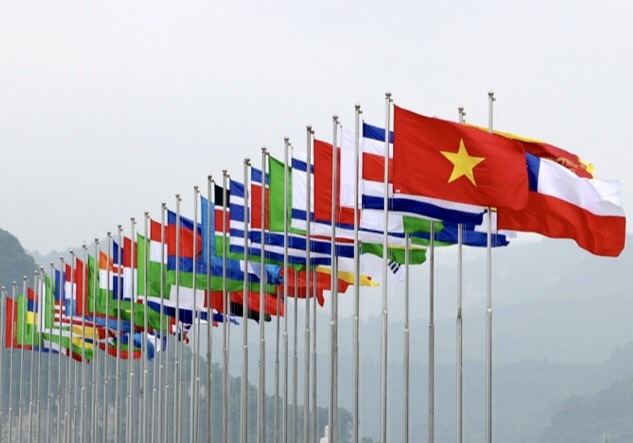.jpg) Expat Corner
Expat Corner

 |
| Phan Văn Santos, now retired, during his match against Brazil Olympic team in 2008. —VNA/VNS Photo |
Anh Đức
In football, perception often matters just as much as performance. And few players in Vietnamese football history understand this better than Phan Văn Santos.
Born Fabio Dos Santos in Brazil, the keeper moved to Việt Nam's Đồng Tâm Long An FC in the latter part of his career, where he stayed for ten years and cemented a legacy, as well as the record for most goals scored by a goalkeeper in the V.League, with 20 goals. His goal against Shanghai Shenhua in the 2006 AFC Champions League was the first goal from a keeper in the tournament's history.
Santos was naturalised in 2007, and was called up to the national team in 2008 to prepare for the AFF Cup, where the notorious story began.
During a friendly match against Brazil’s Olympic squad, the towering, Brazilian-born goalkeeper – who had proudly taken Vietnamese citizenship – was accused of singing the Brazilian national anthem instead of Việt Nam’s. The backlash was swift and unforgiving. Critics pounced, questioning his loyalty, commitment and right to wear the national team jersey. Just like that, a talented goalkeeper found himself at the centre of a controversy that never should have existed.
Now, nearly two decades later, Santos has finally spoken up. And his message is clear: the accusations were baseless, and they ultimately cost him his chance to contribute more to Vietnamese football.
According to Bongdaplus, Santos said that he was closing his eyes and praying during the anthem ceremonies and tried to sing the Vietnamese national anthem despite the language barrier.
Santos's disappearance before the 2008 AFF Cup was not a ban by the Federation, but because he had to return to Brazil as his wife underwent a medical emergency.
But the damage had already been done. The incident cast a long shadow over Santos's career, as well as the prospect of naturalised players on the national team. Whenever the subject was brought up for discussion, the name Phan Văn Santos and the anthem scandal were cited as a reference for those who are against naturalisation.
This was the reality for naturalised players in Việt Nam at the time – they were considered outsiders, no matter how long they played here or how deeply they embraced the country. The idea of foreign-born players donning the national team jersey was still a novelty, met with scepticism and even outright hostility. The national team was supposed to be for 'real' Vietnamese players, not for imports who had built their careers in the V.League.
Fast forward to today, and the conversation has shifted. Naturalisation is no longer a taboo topic – it’s a necessity. And no player embodies this shift more than Rafaelson Bezerra Fernandes, now Nguyễn Xuân Son.
Xuân Son became a phenomenon after he was called up to the national team in the 2024 ASEAN Championship. The Brazilian-born striker was the difference-maker in the team's championship victory, and got people talking after his debut match.
Vietnamese football has evolved, and with it, so has the understanding of what it means to represent a country. A passport alone does not define a player’s commitment – dedication, contribution and a willingness to fight for the team do.
Santos' exoneration comes at a time when the perception of naturalised players is being received in a more positive light, and a plan for more naturalised players to join the team is being expanded.
If Việt Nam truly wants to compete on a bigger stage, it must continue to embrace all players who are willing to wear the jersey with pride, no matter the colour of their skin or the place where they were born.
Because in the end, football is not about where you start. It’s about where you choose to belong. — VNS




.jpg)